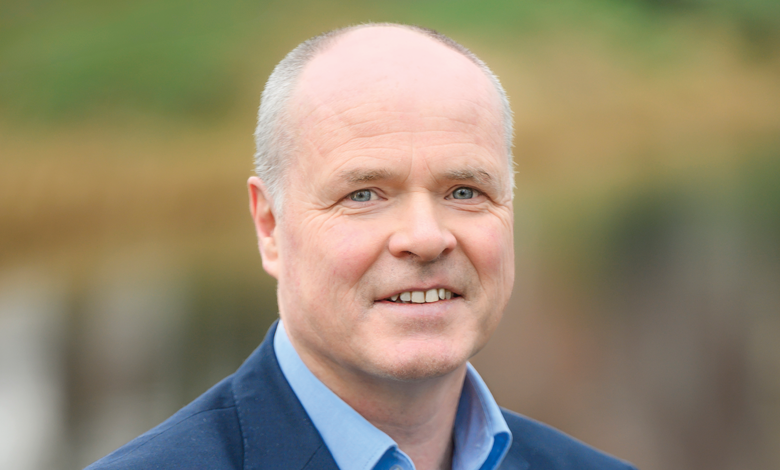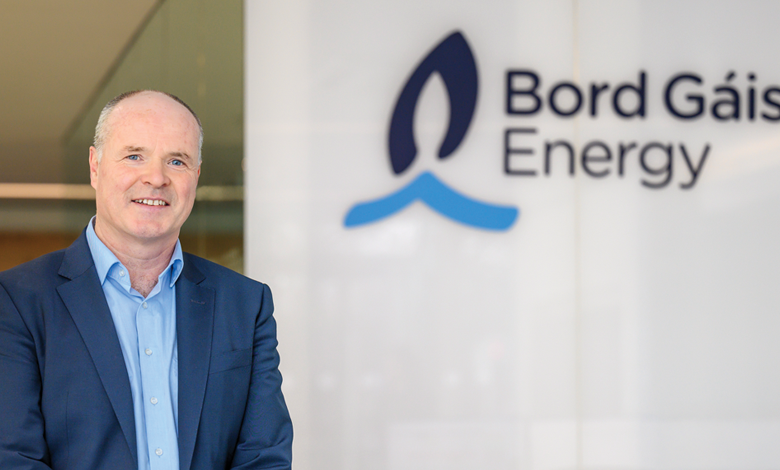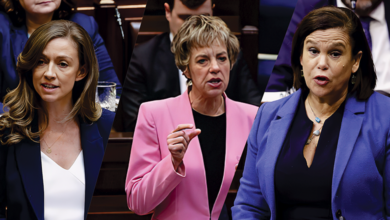Bord Gáis Energy’s Dave Kirwan: Energising a greener, fairer future

Installed in a sleek, minimalist boardroom at Bord Gáis Energy’s Warrington Place headquarters, facing onto Dublin’s Grand Canal, Managing Director, Dave Kirwan speaks with eolas Magazine about his company’s strategic reimagining as a green energy business, as well as the prevailing market and policy context in which it operates.
Dave Kirwan returned to the role of Managing Director of Bord Gáis Energy in summer 2020 after a spell with parent company, Centrica, in the UK. He continues to serve on the Centrica Group Executive Committee and has recently been appointed Managing Director of Centrica Power, a role he takes on alongside his Bord Gáis Energy role.
Last speaking with eolas Magazine in April 2021 – just under a year before the Russian invasion of Ukraine in February 2022 – Kirwan asserted that Ireland stood on the precipice of an “adaptive transformation” and signalled that Bord Gáis Energy would reorientate to become a green energy business – positioning itself at the forefront of the Irish transition to a net zero energy system. That reorientation is well underway.
“We stopped being just a gas company over a decade ago,” he explains. “Now, Bord Gáis Energy is investing in the full value chain to utterly transform our relationship with energy and remove the carbon molecule.”
While Bord Gáis Energy was performing well in what it had always done – looking after its customers, working to deliver competitive supply, and maintaining a respected brand – this was not a sustainable strategy, he explains. Centrica recently revised its net zero target downwards to 2040 and Bord Gáis Energy has now committed to this new target, a prospect that Kirwan says will add further impetus to Bord Gáis Energy’s fundamental transformation of the Irish business.
“Disrupting a traditionally successful strategy is challenging,” Kirwan remarks, emphasising that as the Managing Director of a commercial organisation, he must strike a balance between demonstrable profitability, a return on investment, and a pathway to scalability to which shareholders and customers alike can subscribe.
“From my perspective, given that we have 730,000 residential and business customers increasingly relying on us to help them transition away from their current mode of heat and electricity generation, the challenge has been ensuring that the Bord Gáis Energy ecosystem adapts around this transformation,” he says.
Kirwan contends that the scale of the transformation required is huge and talks about the need to cultivate a culture of self-belief among his colleagues as the energy provider moves to spearhead Ireland’s energy transition.
“Pivoting from the current operation which efficiently produces, delivers, installs and services the energy going into our customers’ homes is simply enormous. The shift in our focus and thinking is already underway and it is actually a very exciting time to be part of this business, and our sector generally.
“No part of the current Bord Gáis Energy ecosystem can be left untouched. What is of paramount importance is that we continue the switch to green while also maintaining smooth delivery of our existing offering,” he says.
Centrica’s commitment to the Irish market
Bord Gáis Energy capital investment is enabled by investment from its parent group, Centrica plc. In 2021, Kirwan approached the Centrica board for the first time, outlining his five-year strategy for Bord Gáis Energy and asserting: “To be a serious player in the net zero transition, Bord Gáis Energy would have to deploy capital.”
At that time, Kirwan recounts, he told the board that Bord Gáis Energy would need more capital than it had asked for at any time since being bought by its parent company.
“Both the Centrica board and the Chief Executive, Chris O’Shea, have been hugely supportive in relation to Bord Gáis Energy’s strategic direction.”
“If we are serious about the energy transition, then this is the trajectory that we must set for ourselves.”
Dave Kirwan, Managing Director, Bord Gáis Energy
Demonstrating this support, Bord Gáis Energy secured an investment of €300 million to construct two new hydrogen-ready peaking plants at sites in Athlone and Dublin which are set to come onstream later in 2025.
Bord Gáis Energy’s “pipeline of ideas” is ambitious and the Centrica board’s support for it is, understandably, conditional. Though Kirwan highlights “the credibility of our team and the board’s constructive interactions with the Commission for the Regulation of Utilities (CRU) and the Government” means that the UK plc’s board has a favourable view of the strategy in Ireland.
Industry collaboration
In May 2024, Bord Gáis Energy announced a new partnership with Corio Generation – a global offshore wind developer – effectively heralding its expansion into the offshore wind sphere.
Emphasising the centrality of Centrica’s financial support, Kirwan asserts that the announcement was indicative of Bord Gáis Energy’s objective of accelerating the transition to net zero by “offering end-to-end green energy solutions required”.
Simultaneously, through its Bord Gáis Energy and Centrica Energy businesses, Centrica plc has also announced a memorandum of understanding with Mitsubishi Power Europe Limited to explore the possibility of developing, constructing, and operating Europe’s first ammonia-fired power station within the Whitegate footprint in Cork.
Most interestingly, Bord Gáis Energy has joined the Kestrel Project alongside dCarbonX and ESB – a competitor in the renewable energy arena.
“Project Kestrel is exploring the redevelopment of the decommissioned gas reservoirs at the Kinsale Head gas field for large-scale natural gas storage before a planned transition to green hydrogen energy storage,” Kirwan explains.
“Five years ago, did I imagine that we would be collaborating with ESB on a project? Probably not. But I think it is great. I have huge respect for ESB. While it is a competitor, it is also an important actor on the energy stage. Ultimately, we agreed there was mutual benefit working together.”
Market conditions
Discussing the prevailing market conditions in which Bord Gáis Energy operates, Kirwan emphasises the fact that – excluding the depleted Kinsale and depleting Corrib gas fields – Ireland has “always been exposed at the geographic extremity of the supply chain”, though it had traditionally been well served with liquidity and options.
Now, however, amid the ongoing Russian invasion of Ukraine, he insists: “The old reliable supply chain is no more. In the past, we operated at times with over supplied markets, deep interconnection, and reasonably good liquidity, while the new norm, at least in the short term, looks a lot different.”
Today, the relationship between geopolitical stability and gas prices is highly correlated. The invasion and its associated sanctions mean that Russian natural gas is no longer flowing into Europe in any meaningful way. Uncertainty, catalysed by protectionism and supply chain disruption, has filled the vacuum.
While the European Commission observes that the gas and electricity markets have returned to “a much more stable and predictable situation”, market traders, as Kirwan highlights, are still grappling to understand whether the associated risk of geopolitical upheaval has been effectively priced to establish a reasonable benchmark price per therm.
The challenge, he adds, is Europe-wide, with every country pursuing enhanced energy independence, considering the cost, and determining whether they are on track to achieve this.
While Irish policymakers are more sanguine about security of supply than was the case three years ago, Kirwan is less than convinced that the energy crisis is over.
“The international landscape has changed significantly on so many fronts, prolonging uncertainty over the short to medium term.”
Retail margins
Discussing the impact of the global energy crisis on Bord Gáis Energy’s retail margins, Kirwan concedes that he was forced to relay successive bad news to the Centrica board over the course of 2022, 2023, and 2024 as profits sunk below pre-energy crisis levels.
In the space of 10 months following the invasion of Ukraine in February 2022, an annual dual fuel (gas and electricity) bill for an Irish household increased from €1,800 to €4,700.
“While these were astronomical price increases for consumers,” Kirwan says, “The reality facing Bord Gáis Energy was that we were losing money throughout that period. We understand that is hard for customers to believe, but it was the reality throughout the crisis.”
The figures speak for themselves. For instance, Bord Gáis Energy recorded a profit of €36 million in 2022, but only €1.5 million in 2024, experiencing a year-on-year reduction of €34 million (a 94 per cent decrease).
“We were willing to absorb losses that we were incurring, and I received significant support from the Centrica board to do so, because we are here for our customers in the long term. We have served Irish customers for over 50 years, and we intend to serve them for another 50 years and more,” he states.
As such, a fundamental aspect of Bord Gáis Energy’s strategy is its intention to play a increasing role in every aspect of the value chain.
Ireland, the Managing Director insists, needs energy players who have a sincere appreciation for customers as well as upstream returns.
“When we make investments upstream in the value chain, we are mindful of the impact on customers,” he says, adding: “We must consider whether investment in peaking plants, helps manage risk and enables us to pass on benefit to customers, as well as making a recovery on the capital investment.”
Economic viability
Discussing the economic viability of renewable gases such as biomethane and green hydrogen, Kirwan admits that in the absence of a functioning market, it is difficult to make the case for capital investment for a future need that “we cannot conceive of today”.
“From an Irish perspective, the subsidies to develop projects are a good start, but they are obviously not competitive in a European context,” he says, maintaining: “Ireland needs to go all in, recognising the need to support momentum around a developing market in anticipation of the value that can be added in several years’ time.”
The consensus across the industry is that “we must start deploying capital now” even though the investment “based on current market structures cannot necessarily be justified in the next four or five years”.
“Stakeholders in the Department of the Environment, Climate and Communications and the Commission for Regulation of Utilities appreciate that, but are wrestling with justification of significant capital expenditure and considering how it can be supported as we move to a net zero ecosystem in Ireland,” Kirwan observes.
His argument is that while the Irish model for investment in energy infrastructure was not simple, it was understandable. “It was done on the basis of volume use. For instance, power stations were built on the basis that the State requires X amount of MW over Y amount of time, and we can produce it at a cost of Z. This determined cost competitiveness, and indicated whether we could expect to sell energy at a competitive price and recover the investment,” he explains.
Conversely, arguing that this economic model can no longer necessarily be applied to today’s infrastructure requirements. For example, developing indigenous hydrogen storage is, Kirwan says, “in most scenarios a critical system requirement” but conventional storage economics will not support the investment needed, and we will need new regulatory frameworks to underpin the investment case.
“How to put an appropriate value on the ability to transport and store renewable power in a net zero energy system is one of the biggest questions we are wrestling with,” the Managing Director explains.
In this new context, Kirwan advises against backing any one single technology, or rejecting another out of hand. “We must be careful and appreciate the value that technologies such as long duration storage and interconnection have and avoid putting all our eggs in one basket,” he warns.
Solar PV
Meanwhile, in late November 2024, Bord Gáis Energy announced its acquisition of indigenous solar PV provider, Swyft Energy. While the green energy provider already had a foot in the solar PV market, including via a partnership with the Irish Farmer’s Association, the acquisition is intended to bring “deeper solar PV capability to residential as well as business and farming customers of Bord Gáis Energy”.
Elaborating on this rationale, Kirwan explains: “We were impressed by the capability and the value set of Swyft Energy, and we wanted to augment our own capabilities and accelerate our charge into solar PV installation, heat pump installation, and end-to-end solutions for homes and businesses.”
Bord Gáis Energy now has a solar division and a capability to assess individuals farms, engage with the SEAI and ESB Networks, and produce an optimised solution for the use of solar PV on 250 farms to date, while overseeing the procurement and supply, as well as ongoing maintenance.
“The process of putting that platform together has taken three or four years. It will take several more years before it can be commercialised. That is the reality for businesses like our own, which are serious about leading the transition,” he says.
Skills capacity
Pursuit of Bord Gáis Energy’s strategic ambition of transitioning to net zero by 2040 – in support of Ireland’s national climate objective of achieving net zero greenhouse gas emissions by 2050 at the latest – is bolstered by its paid apprenticeship programme.
“We are developing our own organic skills base ranging from the traditional gas work, to insulation, solar PV, and heat pumps. Consider the skills base in Ireland; there is clearly more demand than supply. Everyone is competing for the same talent, so we must take a highly proactive approach, augmenting our own people’s current skillset, and building new talent through our apprentice programmes.
“We are hiring many more college students than we traditionally would have and formalising our graduate programme in a way we have never done before. It is a very exciting time.
“I met with the graduate cohort in late 2024, and they remarked upon the diversity of roles within Bord Gáis Energy. As we engage in cutting edge work in every aspect of the business our it has never been more exciting to join our company,” Kirwan comments.
Policy context
Against the backdrop of the newly formed government, conversation turns to the renewable energy elements of Programme for Government 2025. “The fundamental challenge facing politicians is the short election cycle within which to make impact while seeking re-election,” Kirwan articulates.
“In reality, given the significance of the climate and energy challenges we face, the necessary decisions, those needed to be made in the coming years, are unlikely to unlock any immediate electoral benefit. This makes what needs to be done politically really challenging but no less important, it really is a time for all of us to lend our support to doing the right thing even if not immediately popular.”
For a secure and green energy future in Ireland, what is required, he suggests, is a deep and transparent conversation at senior levels which considers each scenario and adopts a logical and rationale approach to determining which forks in the road are best taken.
There is, he says, “a need for long-termism” and collaboration will be key. “Collaboration must be more regular, dynamic, and open. There must be a degree of trust that it is not a self-serving conversation. A big test in the next two years will be the dialogue between the Department of the Environment, Climate and Communications, CRU, EirGrid as the electricity transmission system operator (TSO), and organisations such as Bord Gáis Energy.
“That the significant scale of capital investment required to deliver the energy transition has not been properly quantified is still not fully appreciated in our society. No single entity will deliver Ireland’s ambition, and there is no monopoly on good ideas, nor can there be a reliance on any single organisation to deliver it. We all have a role to play,” he summarises.
His message for policymakers is simple: “Include us.” Elaborating on this, he muses: “When considering the energy future, there are many diverse outcomes. If there was overreliance on a single perspective, I would be worried.
“We will arrive at the right blend of solutions via diverse stakeholder engagement and real dialogue, facing into some near-term contradictions. To paraphrase Keynes, the challenge is not in developing new ideas, it is letting go of old ones. There is a real paradigm shift underway.”
Looking to Bord Gáis Energy’s march to net zero, Kirwan encapsulates his ambition: “We want to help customers decarbonise their homes and businesses, providing a wraparound service with transparency, value sharing, and the interests of the planet at the core. We want to energise a greener, fairer future. It is both challenging and exciting.”
|
Profile: Dave Kirwan Dave Kirwan’s career has taken him from Texas to Vietnam, Belfast to Cork, Dublin to Britain, and back again. Asked to identify a singular lesson from the experience, he does not hesitate. “Family first,” he replies. “When all is said and done Catriona, and my four kids are the people that really matter.” |






